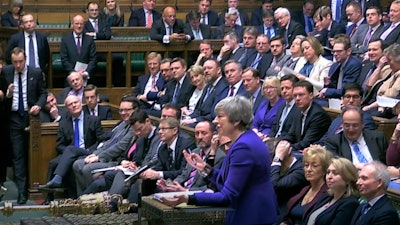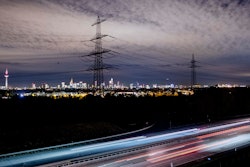
BRUSSELS (AP) — Leaders across the European Union offered a united chorus of "No" on Wednesday to Britain's belated bid to negotiate changes to the Brexit divorce deal so Prime Minister Theresa May can win the backing of her Parliament. In London, May acknowledged that her government hasn't decided exactly how it will try to change the deal to address British lawmakers' concerns about the Irish border.
All this while Britain is headed for the EU exit in less than two months, on March 29. "The withdrawal agreement will not be renegotiated," said Jean-Claude Juncker, the chief of the EU's executive arm.
Buoyed by winning a vote in Parliament, May has vowed to secure "legally binding changes" to the withdrawal agreement. British lawmakers voted Tuesday to send May back to Brussels seeking to replace an Irish border provision in the deal with "alternative arrangements," ignoring EU warnings that the agreement cannot be altered.
"We've been down that track before and I don't believe that such alternative arrangements exist," Irish Prime Minister Leo Varadkar said. Chief EU Brexit negotiator Michel Barnier said that "frankly, no one from either side is able to say precisely, in a clear way, what the nature of these alternative arrangements would be, whether they would be workable and effectively fulfill the aims of the backstop."
Much of the opposition centers on a border measure known as the "backstop," a safeguard mechanism would keep the U.K. in a customs union with the EU to remove the need for checks along the border between the U.K.'s Northern Ireland and EU member Ireland after Brexit.
The border area was a flashpoint during decades of conflict in Northern Ireland that cost 3,700 lives. The free flow of people and goods across the near-invisible border underpins both the local economy and Northern Ireland's peace process. Many pro-Brexit British lawmakers fear the backstop will trap Britain in regulatory lockstep with the EU, and say they won't vote for May's deal unless it is removed.
German government spokesman Steffen Seibert said "opening up the withdrawal agreement is not on the agenda."
Britain and the EU struck a divorce deal in November after a year-and-a-half of tense negotiations. But the agreement has run aground in Britain's Parliament, which overwhelmingly rejected it on January 15.
May was due to speak to Varadkar and European Council President Donald Tusk on Wednesday, and was meeting with opposition Labour Party leader Jeremy Corbyn in an attempt to find elusive cross-party unity on Brexit.
May conceded that her government hadn't settled on a way to replace the backstop, telling lawmakers that "there are a number of proposals for how that could be done." May said measures under consideration included a unilateral exit mechanism from the backstop for Britain, a time limit to the backstop and "mutual recognition and trusted trader schemes."
The EU says the backstop is an insurance policy and as such can't have a time limit or a get-out clause. The EU parliament point-man on Brexit, Guy Verhofstadt, underlined that nobody in Europe wants to use the backstop, but that it's "needed to be 100 percent sure that there is no border between Northern Ireland and the Irish republic."
Verhofstadt said the only way for May to win concessions would be to back away from her long-held stance that Britain would not remain part of the EU's customs union after Brexit.
"If the future relationship is, for example, a customs union that makes it completely different," Verhofstadt told reporters. Irish Foreign Minister Simon Coveney, summed up the exasperation echoing across the continent, saying: "We are, quite simply, running out of road."
___
Lorne Cook contributed from Brussels.





















